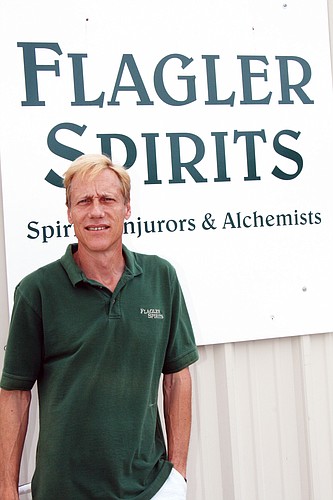- November 23, 2024
-
-
Loading

Loading

Founder of three-year-old liquor distillery Flagler Spirits, Jimmy Day is carving out a niche, from Hargrove Grade, in Florida’s drinking market, 40 gallons at a time.
Jimmy Day is your quintessential “scrappy” upstart entrepreneur.
Cradled inside a small warehouse on Hargrove Grade is his baby, Flagler Spirits, Spirit Conjurors and Alchemists, a three-year-old handmade artisan rum, whiskey and vodka distillery. With Day’s current setup, he can distill 40 gallons of liquor at a time, as opposed to the “big boys” — companies like Jim Beam and Bacardi — pumping out more like 80,000 gallons through continuous column rigs and stainless-steel oil-refinery tanks.
But according to Day, he has one major advantage: “When you cook a hamburger in your backyard, it tastes a lot better,” he said. Then he pointed to the stills. “That’s our backyard grill.”
No part of Flagler Spirits’ new product comes from out-of-state. The labeling is done in Palm Coast, the glasswork in Jacksonville. The company uses local produce whenever possible. Every bottle produced has been touched by Day’s hand.
Day hails from a long line of liquor-makers. From moonshiners to hobbyists, he learned the trade from his family. In college, after learning the chemistry to the process, he thought he’d try it as a living.
“(The greater St. Augustine area) is the birthplace of distilling in the new world,” Day said. And maybe it could thrive again, he suggested, citing statistics from 1990 when there were only 60 distilled spirits plants in the country; that number rose to 90, in 2000. In 2010, he said, it spiked to 270.
“And that jump is us little guys,” he said. “They’re looking at us as the new microbrew explosion ... and ... we’re not missing this!”
Financially, though, it’s hard out there for small businesses. With federal excise taxes cutting into profits, Day and most microdistillery owners are all for recently proposed House Bill 777, which would lower the tax rate on small distilled spirits producers — stills that produce fewer than 100,000 gallons of proof spirits a year — saving Day and similar-size facilities 50 cents on every bottle sold.
This kind of savings could reshape the liquor industry, according to Day, allowing micros to expand rapidly and compete with the “big boys.”
After so many years, Day has a relationship with his product. If the liquor’s too harsh, too acidic — too anything — he can tell, just by smelling, seeing or touching it. He tweaks temperature levels to modify batches, resetting boiling points to “make cuts” from the compound.
“The still’s just waking up,” he said, watching newly made whiskey begin to trickle into a large blue drum through clear tubing on one of its sides, waste filtering into bottles through separate tubing on the other.
“When you just start out,” Day said, “you’re like Martin Luther King. ‘I have a dream! I have a dream!’ And no one wants to jump on board … Then you have to convince them to buy your product.”
Day began introducing spirits at local events, like the Taste of Flagler. This year, his rum will be the official drink of October’s 2011 St. Augustine Pirate Gathering. His products can also be found in Sharps Discount Liquors, Woody’s Bar-B-Q and Scruffy Murphy’s in town.
“Once people try it, that’s three-fourths of the battle,” he said. “People try it and they come back and keep buying it. That’s the secret to success.”
We are beginning to realize, Day said, that to support the local economy, we need to keep our money local. “We need to buy things from the United States, we need to buy things from Florida, and we need to buy things from Flagler County.”
“I cannot afford to buy things from other countries,” he continued, “to send money away, where it will never come back … People need to buy from the smaller company, because the smaller company will keep money here … You’ve got to back the little guy.”